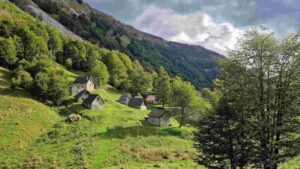Abstract/Description
Started in 2021 and ongoing until 2027, the project LIFE ShepForBio constitutes an unprecedented effort to connect the voices and nuances of the pastoral dimension across Europe into a coherent structure. The project aims at establishing a European-wide network of pastoral schools and stakeholders and provides the opportunity to unlock the much-needed dialogue about the current conditions of the shepherd profession and how it provides a tool to face a number of challenges such as climate change adaptation, land abandonment and biodiversity conservation, the disappearance of cultural heritage, generational turnover – to name a few. Through international conferences (two already organised, one on the role of Shepherd School and pastoral training for biodiversity conservation and one on ecosystem services provided by pastoralism), on-line discussion forum and newsletter, the project bridges the collective reflection on these and many other burning topics while looking at the future by developing the first Shepherd school in Italy. Building on the successful outcomes of different engagement activities involving pastoral stakeholders, the presentation aims to discuss the findings of this explorative attempt, clarifying the needs and gaps of the pastoral actors in Europe and tracing some suggestions for future endeavours.


